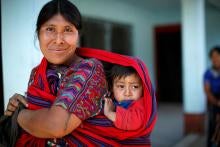Evaluation of knowledge about childhood cancer among health professionals in five cities of Colombia
Objective
To assess primary health care professionals’ knowledge regarding the timely detection of childhood cancer in five priority cities in Colombia.
Methods
Descriptive cross-sectional study with an analytical component, of 141 nursing, general medicine, family medicine, and pediatrics professionals in five of the Colombian cities with the highest rates of mortality due to this cause. A multivariate analysis was performed to predict the percentage of success obtained on each section of the test and overall.














